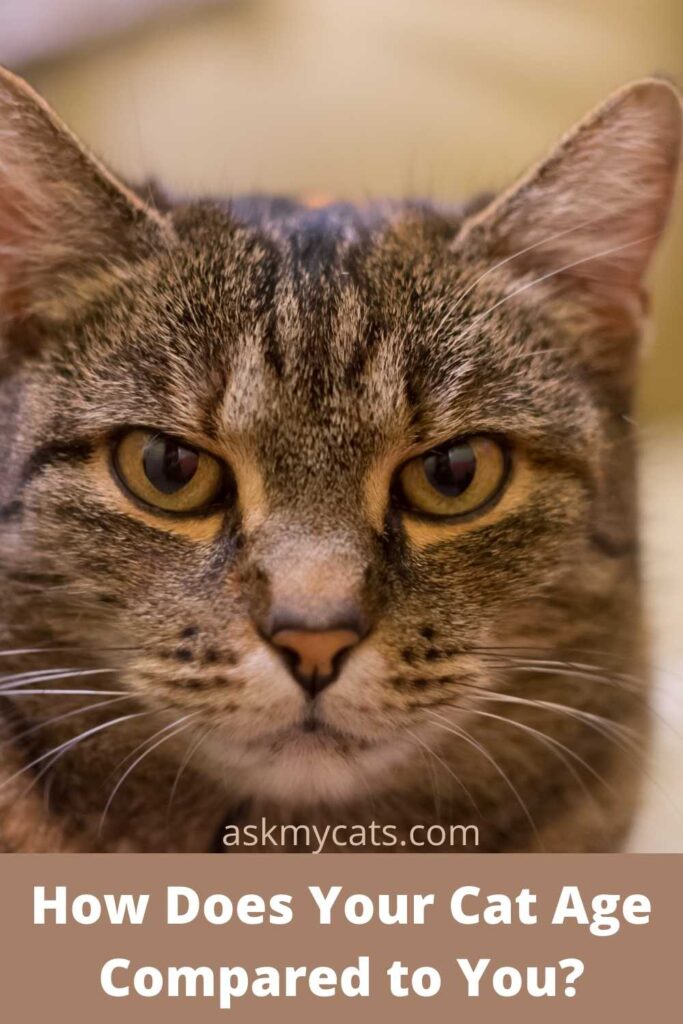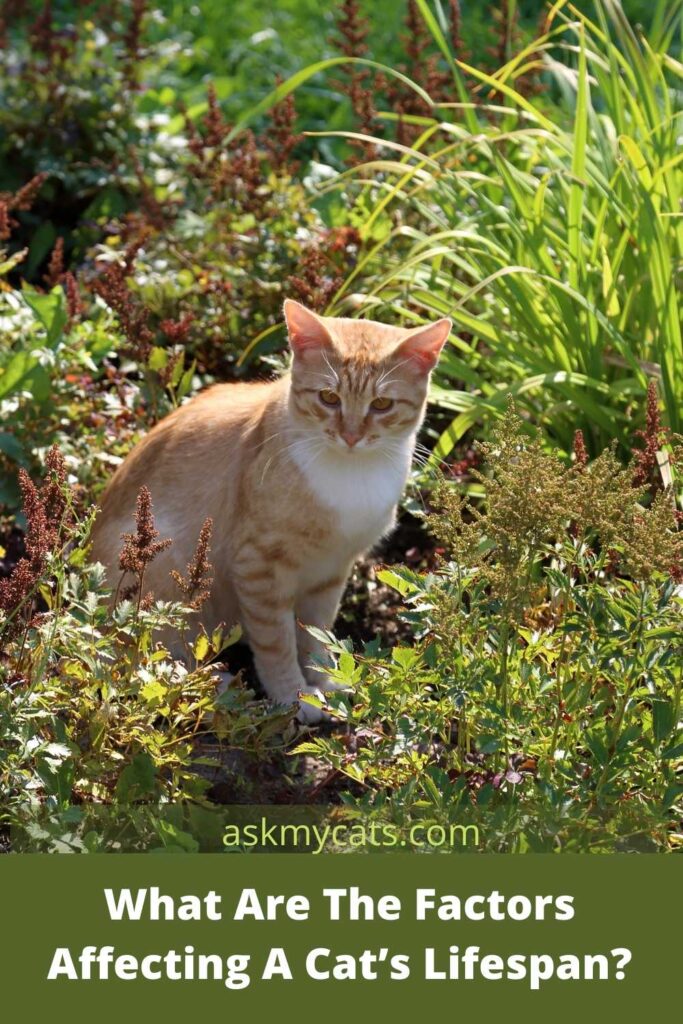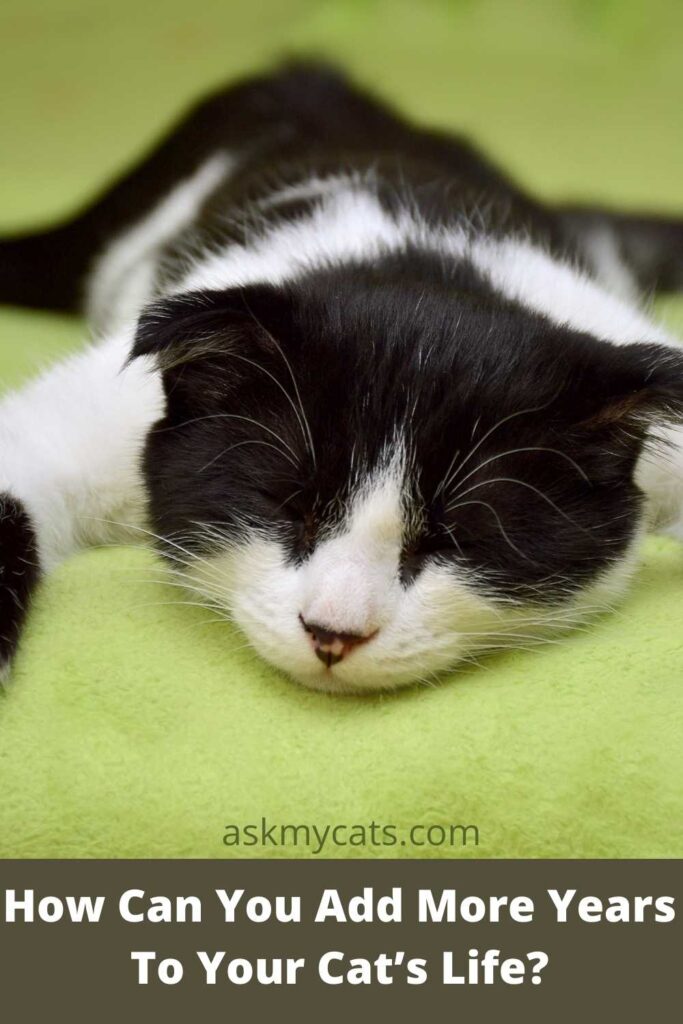If I’m not mistaken, you’ve probably heard the expression that a cat’s lifespan is equivalent to seven human years. Because I did and thought it was true up until I got a cat, at which point I started looking for solutions to satisfy my curiosity.
What if I tell you that it is wrong?
I mean, they surely do mature fast enough but that’s not the correct number of cat years you are counting. They grow rapidly in the first two years and reach adulthood. Eventually, they age slowly until they reach their 20s.
Some felines age enough to live up to 25 to 30 years old as well.
Behold your interest and jump right into this article.


Give Your Cat the Perfect Day
Get the Free Ebook!
Does My Cat Age Faster Than Me?
Yes, cats age faster than human beings! Your cat would have lived through half of its lifetime by the time you reach the age at which you start perceiving the world.
Let’s start by noting that from birth to death, people spend around 5% of their time being helpless, having imperfect control over their bodies, and having little to no capacity for survival.
After a few days, cats stand up straight and start to walk. As a result, by the age of one day, they are considerably ahead of humans in the process of aging.
Why Do Cats Age So Fast?
Cats can be found in a wide variety of sizes and shapes. As a result, the life expectancy of various cat breeds varies. Various factors, such as a cat’s breed, nutrition, and level of activity, all affect how fast they age and how long they live on average.
Some cat breeds are predicted to live for about 12 to 15 years old, while others often live into their 20s. I’d say that’s a pretty huge difference!
The longevity of your cat’s life is more likely to be impacted by their diet, environment, and use of heartworm preventatives like Advantage Multi or Heartgard for cats.
Having said that, knowing the typical lifespan of their breed can be helpful. For your curiosity, here’s a list of the lifespans of different cat breeds:
- Bengal: 12-16 years
- Siamese: 15-20 years
- Ragdoll: 12-17 years
- Russian Blue: 15-20 years
- Maine Coon: 12-15 years
- American Shorthair: 15-20 years
- Manx: 8-14 years
- Japanese Bobtail: 12-18 years
Why Do Cats Mature Differently From Humans?
I’m confident this doubt will be answered if I provide you with a list of reasons:
Cats live shorter lives than people, but as part of their survival instinct, they develop swiftly for mating and hunting (at around 6 months).
Cats do not experience menopause as people do, therefore they can have kittens for the rest of their lives. Therefore, it’s crucial to get them neutered.
Since male cats can continue to father kittens throughout their entire lives, spaying male cats are also required.
How Does Your Cat Age Compare to Humans?
If you wonder, “ How old is my cat in human years?” Then let me give you a quick calculation:
- The first year of a cat’s life is equal to 15 human years (approx).
- The second year is equal to 9 human years (approx).
- After the second year, each additional year is equal to about 4 human years.
Now sit back and calculate.
According to American Animal Hospital Association (AAHA), the 1:7 ratio is a myth.

1. Is This Calculation Valid?
Yes, this calculation is valid! AAHA states that when calculating a cat’s age, they look for the changes in their behavioral pattern and to see if match the stages of human life.
Basically, it means that a 1-year-old cat is physiologically equivalent to a 15-year-old human child.
However, these changes differ with every breed.
2. Outdoor and Indoor Cat’s Age Calculation
The second rational question that arises is, ”Do indoor and outdoor cats age the same way?“
It is a known fact that indoor cats outlive outdoor cats so yes they do age differently.
According to the AAHA, cats that live indoors are less likely to suffer injuries or suffer from illnesses, which could lead to longer lifespans.
But again it can be because environmental restrictions and excessive protection make indoor cats may be more susceptible to risks.
3. Is Your Cat Getting Old?
Your fluffy baby isn’t as energetic anymore. I know that worries you but you are not sure if she’s aging or caught some disease. In such cases, visit your vet.
Or
Look out for signs like:
- Tartar build, Yellow-stained teeth
- Thick, coarse, and gradual greying of fur
- Reduced excitement level, muscle and weight loss, and arthritis
- Increased anxiety and confusion
- More roaming around tendencies and purring.
- She is likely aging if any of the behaviors on this list apply to her.
Must Read: Do Outdoor Cats Live Longer?
What Are The Factors Affecting A Cat’s Lifespan?

1. Their Breed
Here’s an interesting fact- Mixed breed cats tend to live longer than pure breeds since they are genetically more diversified than the latter. It helps them to fight diseases and ensure longevity.
2. Medical Care
Regular medical checkups are a way to ensure they live long. Obviously, your cat cannot start talking to you, you need to observe them. Generally, by the time owners realize some changes, it becomes too late.
Be an attentive caretaker and do not let mishaps happen!
3. Food
Dehydration is not uncommon in cats, so always keep a few drinking options ready for them. Excessive food can cause weight gain and constipation and little food can lead to weight loss.
Weight, an important factor in a cat’s lifespan should be optimal. It can significantly influence its life for 6 months. Hence give them their favorite protein-rich diet.
4. Physical and Mental Well-being
Outdoor cats get exposure to physical activities hence indoor babies should be given some interactive time as well. Cat toys and hunting games followed by a treat are a good form of exercise for cats.
Your cat, if neglected can perish because of anxiety and boredom. Spend time with them and keep their mental spirits at an all-time high.
5. Neutering
Spaying your cat reduces the risk of developing diseases that can affect their reproductive system in old age.
Did you know- Female cats live longer than their male counterparts?
Also, check out Do Female Cats Live Longer Than Male Cats?
How Can You Add More Years To Your Cat’s Life?
Your cat is your child and you’ll do everything in your power to give it a full life. Here are some ways in which you can be sure of doing so:

1. Don’t Let Them Flee Often
As long as they are inside the house, they are safe from the dangers of the world. They are less likely to come into contact with parasites and pests that spread disease.
Your home is a safe environment for your cat, but watch out for the house plants. Try growing wheat grass if your cat is hankering after greens.
2. Periodic Grooming
To accustom your cat, regularly brush his soft, shiny coat. If you notice any changes in shape or texture, head right over to your veterinarian.
Lumps, warts, or sore patches could indicate a variety of uncomfortable and sometimes dangerous medical issues.
3. Clean Litter Box
Would you like to use a filthy restroom? I guess not. Neither does your cat. Your home will smell better if you clean their litter box every other day, and you’ll be able to spot any changes in bowel or urinary habits right away.
Instead of attempting home cures if your cat has diarrhea or blood in her pee or feces, consult a veterinarian.
4. Clean Water
Cats, like human beings, need constant access to clean, fresh water to stay hydrated. They have very specific tastes in water and would turn it down even if it touched the side of their cat bowl.
Whisker exhaustion, a stressful condition for cats, can be prevented by switching to large, flat food and water dishes. Another wonderful option is a cat water fountain.
5. Vet! Vet! Vet!
Not enough can be stressed! Veterinarians can discover and treat potentially fatal medical disorders by doing routine wellness examinations, routine lab tests, and complete medical history checks.
They are familiar with their normal behavior and can typically determine over the phone whether a weird new habit calls for quick medical attention.
Check out the fact about do cats forget their owners
Frequently Asked Questions
Do cats die young?
Due to different external environmental variables, an outdoor cat’s life expectancy is significantly lower than that of an indoor cat. A feral cat’s life expectancy is even lower. However, any animal will live longer if you place it in a secure setting and see to it that its nutritional and medical needs are addressed.
Final Words
Well, that’s it. Now that you know why your cat ages faster than you, why don’t you create some awesome memories with them?
Although it is a concerning subject, this is simply how nature operates for them. But there is nothing to worry about! Give them the life they deserve by spending time with them.
Write in the comment section how long your cat has lived and what you did to make its life exciting!
Is it true that female cat in heat attracted to male human
